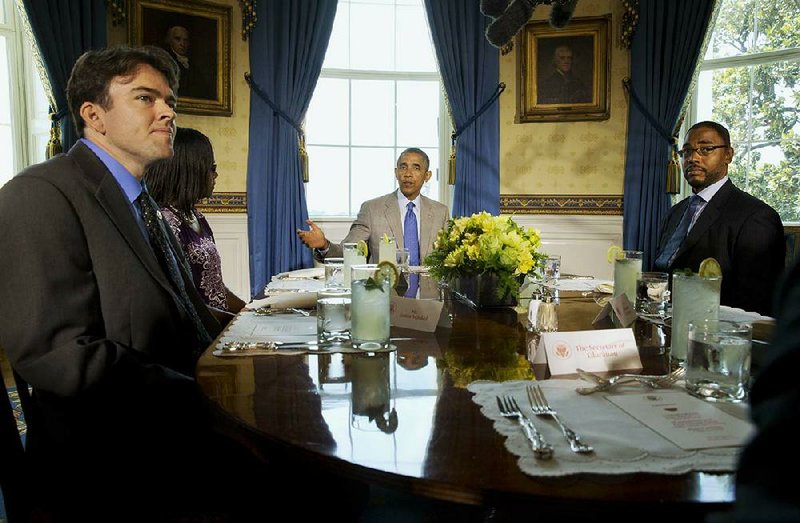Lunch with the president on Monday included a relaxed conversation about teaching in high-poverty schools that lasted about an hour, said Justin Minkel, a Springdale teacher invited to the White House with three other teachers from around the country.
President Barack Obama invited the teachers to hear why they work in schools serving low-income children and how their experiences can help recruit teachers to those schools, Minkel said.
"People talk about how Obama speaks eloquently," Minkel said. "I came away thinking he listens eloquently. He really was listening very carefully."
Secretary of Education Arne Duncan, who also attended the lunch, on Monday announced the start of the Excellent Educators for All Initiative, which includes spending $4.2 million on a support network to help states and districts ensure all students have access to quality teachers.
Minkel, 36, lives in Fayetteville with his wife, Karen Minkel, and their two children, ages 6 and 3. Justin Minkel has eight years of experience in the classroom, primarily at Jones Elementary School in Springdale. He was the 2006 Milken Educator of the Year for Arkansas and the 2007 Arkansas Teacher of the Year.
He has been on a two-year professional leave for a variety of projects, including serving on the board of the National Network of State Teachers of the Year and writing an opinion blog for Education Week. He will return to Jones Elementary in the fall teaching first grade part time.
Jones Elementary School is a high-poverty, mostly minority-group school that provides many services to help support the children and their families, said Jones Elementary Principal Melissa Fink.
"It's an honor that a teacher from Springdale -- let alone Jones Elementary -- was invited to have lunch with the president of the United States and to get to talk about our school and our teachers and our kids," Fink said. "Justin is an ambassador for all children. He goes above and beyond to plan engaging lessons for kids. He's very thoughtful and reflective about his teaching practices. He is a voice for every child with all the work he's doing at the national level."
While eating salmon, vegetables and peach cobbler in the Blue Room at the White House, Minkel had the opportunity to discuss with Obama and Duncan his thoughts about what keeps teachers from going to schools serving predominantly low-income children.
He told Obama and Duncan that the fixation on standardized tests strips out much of the joy and wonder of children learning.
While his principal struck a balance, Minkel said he has found that teachers at many high-poverty schools spend lots of their time preparing for tests with boring activities designed to help students choose the right answer.
"It makes it not a lot of fun to be a teacher," Minkel said.
Teachers want more time to interact with their students and get them excited about the world, giving them chances to act like scientists, engineers, architects and artists, he said.
Test results published every year often put shame on high-poverty schools, because schools with lower scores tend to be those with higher levels of poverty, he said. The experience can be demoralizing, especially when students who were more than a year behind showed growth but didn't grow enough to earn a proficient score.
"Teachers are doing wonderful things," he said. "Kids are making more than a year's growth. If they are starting far below grade level, it looks like the teachers are not doing as well. It has more to do with where the kids were."
Minkel said he would like testing to focus more on how much growth has occurred in student learning and to measure critical thinking, innovation and the ability of students to work together.
He also thinks teachers need autonomy in the classroom, he said.
"At Jones and in Springdale, most teachers feel like they are respected as professionals," Minkel said. "If you talk to people from inner-city schools, they don't. They read a script and all their students do the same worksheet."
At Jones, teachers have flexibility to try new strategies, he said. Minkel wanted to teach his second-grade students to play chess, because he had read studies showing that the game could help their reading and problem-solving skills. He proposed the idea to Fink and shared the research with her, and she supported him, he said.
Retaining teachers in low-income schools requires a supportive superintendent and district administration, Fink said. Teachers must have time during the day to talk to each other, and Fink has systems in place to ensure those meetings are productive and focused. She said she has sought to create an environment where teachers feel safe taking risks and aren't shamed if their ideas flop.
"What we're trying to accomplish is bigger than what one person can do," Fink said. "We're there to do whatever we need to do to help them be successful in helping kids."
For Minkel, ensuring classrooms are led by great teachers isn't about good teachers versus bad teachers, but rather good teaching versus bad teaching. Most teachers he's met love children and want to do their best, but not every teacher has the level of training and support that Minkel has received at Jones, he said.
Minkel remembers hearing Obama say he is where he is because of teachers.
"The last thing the president said is it made him feel hopeful," Minkel said.
Metro on 07/10/2014
